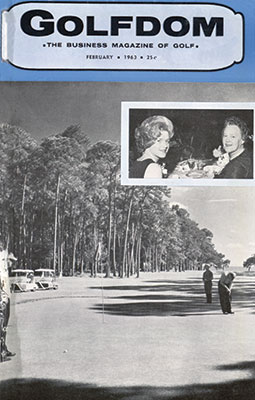The Golfdom Files: Superintendents’ headaches never disappear
Have you ever just wanted to vent to someone else? In the February 1963 edition of Golfdom, the editors allowed three superintendents, Ray Gerber of Glen Oak GC, Glen Ellyn, Ill., James A. Reid of the Suburban Club in Pikesville, Md., and Burt K. Anderson of Augusta (Maine) CC, to do just that. They talked about the three things that gave them their headaches: labor, turf maintenance and weather.
 Superintendents’ headaches never disappear
Superintendents’ headaches never disappear
Soil hard to dent
Anderson traces the source of Augusta’s trouble to impermeable soil. Agronomists agree with him that perhaps 30 to 40 percent of the course is covered with soil that has little or no penetrative quality. In recent years, the U.S. Soil Conservation Service has helped Burt attack the problem. Waterways and diversion ditches have been dug, drains opened and tile lines put in, but it is going to take a few more years and a considerable cash outlay before the entire course is reclaimed.
Subpar soil of this nature, of course, results in poor drainage. Every year a good deal of Augusta’s fairway turf is lost because of spring sogginess and is replenished with nothing more promising than annual bluegrass and knotweed.
Those Maine winters
A superintendent can go along with this condition, says Anderson, hoping in time to correct it. But when he has subnormal drainage combined with Maine winters to contend with, that is something else. Alternate rain and snow and freezing and thawing through November and December usually give a good start to an ice layer by the first of the year. Thirty days later, greens, and for that matter practically the entire course, are locked in ice.
With circulation shut off from above, there has to be good drainage if the greens are to have a chance of surviving. Having endured the ice condition for a number of years, Anderson believes that bentgrass tolerates having the air shut off during the winter and the waterlogging that comes with the spring thaw much better than annual bluegrass.
Theory on winterkill
Experience and observations have prompted another theory that Anderson believes should be considered by superintendents in the northern climes. “When the frost leaves the ground,” he says, “the ice layer separates from the turf and starts to weaken or break up in spots.” From this time until the snow departs is a critical period. If the ground is impermeable, or nearly so, water fills the space between the ice and earth and smothers the turf. If the soil can be penetrated, water passes off, allowing the air to circulate in this void and enabling the grass to survive. “If at all possible,” the Maine green master concludes, “the ice should be removed from the greens during the critical period.”
The last statement, of course, brings up the question of how the ice is going to be removed. That is one that has stumped the experts for a long time. There is no effective ice-removal equipment available today, and even if there were, getting it to the green sites would pose a difficult transportation problem. Until thawing conditions set in it is almost impossible to get rid of the ice sheets that cover the greens.
The labor problem
In going into the labor situation, Ray Gerber looks at it from an overall viewpoint, while Jim Reid cites some specific cases in examining it, adding that these are typical of what a superintendent repeatedly has to put up with, whether he’s in the business for three or 30 years.
“In our locality,” observes Ray Gerber, “it’s almost impossible, except by accident, to get reliable men under prevailing conditions. Turnover is much too high, and almost constant training of new men takes too much of our time. It may be necessary very soon for clubs to provide living quarters for maintenance department employees as they do for others if they are going to attract the right kind of help.”
To view the entire story from 1963, click here.
Photo: Golfdom










